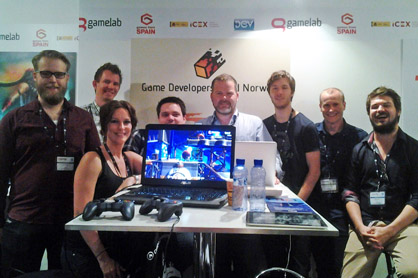Videogames 'made in Norway' in Barcelona
 The internal fight between good and evil, how to use algebra in your daily life or how to help chronically ill patients… Videogames are not only for children and they are becoming a real economic engine, as was proven in Gamelab, the most important Spanish fair in the field of videogames, whose 2014 edition included the participation of a Norwegian game developers group through the EEA Grants.
The internal fight between good and evil, how to use algebra in your daily life or how to help chronically ill patients… Videogames are not only for children and they are becoming a real economic engine, as was proven in Gamelab, the most important Spanish fair in the field of videogames, whose 2014 edition included the participation of a Norwegian game developers group through the EEA Grants.
04.07.2014
Spanish videogame industry anticipates growing by 130% in the next three years –increasing its turnover of 313 million in 2013 and 330 companies-, according to the Spanish White Paper on videogame development. In Norway, there are a hundred companies and 400 people, mainly start-ups, focused on the videogames development. Spanish and Norwegians agree that in this field there are not local markets but global and that international networking is crucial. For that reason, in order to strengthen bilateral relationships and to identify business opportunities, a group of Norwegian game developers participated in Gamelab –a fair held between the 25th and the 27th of June in Barcelona-, a Bilateral Relations activity within the EEA Grants Cultural Heritage Programme, operated by the Spanish Ministry of Education, Culture and Sport. In October, a group of Spanish game developers will do the same in Konsoll fair in Bergen.
Natascha Röösli is among this small 10% of women who work in the videogame sector. Her company, Rock Pocket Games, is an indie studio just on the verge of launching Shiftlings, their new game which the experts in Barcelona could test and approve. “There is so much talent in Norway, they only need a little help”, explains Röösli, to catch up with powers in this field like their neighbours Sweden and Finland. The Norwegian government launched a plan of action to support innovation, and the game developers were included. However, Linn Sovig, Project Manager of Game Developers Guild Norway, an organization which gathers the companies of this sector, points out that this plan is not enough and that private investment should be motivated through less taxes and more incentives.
For six months, Ole Helland has been shut in his indie studio (Antagonist) developing a game called Through the Woods, a third person horror adventure inspired by Norwegian nature and art history, borrowing freely from Norse mythology. So, he was delighted to attend Gamelab to “share experiences with other developers and to bring new ideas”. What turns a videogame into a success? Tom Joran S. Ronning, from the Norwegian studio Working Mill, explains that “success is a mix of expertise, hard work, luck, marketing and timing, the key is not to be the first but to do something better than others at the right time”.
As far as the Spanish and Norwegian relation in this sector is concerned, “is developing because we have a lot to learn from each other: going to market and marketing are the Spanish strongholds and Norway has a lot of ideas and talent”, explains Linn Sovig.
And what about videogames future? The future of videogames is in the educational sector, health or gamification. But above all, to stand out from the crowd. As Linn Sovig concludes, “the talent is there and you only have to find out”.